One of the least compromising and most savage Norwegian Black Metal bands in existence, Tsjuder erupted into being in 1993 to forge its own Satanic blueprint upon the landscape of ever-morphing, ever evolving odes to the Horned One. Unlike many of those outfits, the brainchild of Nag and Draugluin found their wintry path of frostbitten Hellhammer, early Bathory, and early Celtic Frost, and across the years have trodden a path that while worn has not dulled one bit. The riffs, the darkness, and the ability to innovate within revered musical parameters, is discussed below at length, as Jan-Erik Romøren aka Nag, bassist and vocalist and co-founder of the devilish duo, was kind enough to sit down and talk about new album Helvegr and much more.
Cryptic Rock – Eight years have passed between the release of 2015’s Antiliv and your latest 2023 album Helvegr. How did you know that it was the right time to create an album once again?
Nag – I don’t think we know that this is the time to create an album. I think that’s just the feeling, the atmosphere, whatever we are feeling. And we spent quite some time creating music. So we might create one to three songs, and then, we might spend a couple of years before the fourth song, because you need to have the correct inspiration and the mood to make the music.
And we never stress. We don’t start planning studio time or anything, before we are ready, before we are done. Well, we could never say, “Okay, the next album will be in two years, or five years or 10 years,” because we don’t know.
Cryptic Rock – You do not succumb to outside pressure. Tsjuder has been around since 1993 and Helvegr is only your sixth full-length studio album. When you look at many of the Norwegian black metal bands that have come out of that era, many of them have departed from their original musical vision. Sometimes it works, and obviously, it’s subjective. Sometimes it loses the plot, and gets weaker, and distilled to other things. With Tsjuder, I would say arguably that riffs rule the story here. You mix in thrash parts, at just the right time and frequency, and I think you have more sonic diversity than some people will give you credit for. Remaining within the vision of your band, and not changing with the times for its own sake, does that create more of a challenge for you, to write songs with no frills, nothing to hide behind, just the guitar?
Nag – Well, first of all, thank you. I appreciate it. And second, no, it’s not a challenge, because we make the music that we would like to make. The only thing I can say, that from time to time, we could make a riff for a song, but we would later decide that maybe that’s not really for Tsjuder. Maybe that song would fit better in another band, and we’ll just disregard that song. So it happens. It doesn’t happen that often. And also, on Helvegr, Draugluin actually, quite a few times, asked me “is this riff too thrashy? Should we kind of mix more black metal into it, or does it work for us?” I don’t know the English word, but we’re quite determined on which riff or which song will fit the band. Because we said, from the very beginning, that Tsjuder will always be raw and brutal Black Metal, and no fucking compromises. So we will stick to that.
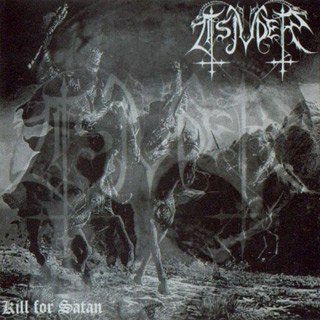

Cryptic Rock – It is refreshing to see art with no compromise. So much has changed in the world between the release of your last album Antiliv and now with Helvegr. Do you think that black metal is going through some sort of identity crisis that has been forced upon it? As a musician, you’ve embodied straight-ahead, direct Satanism through art. How does it make you feel to see Satanism become so politicized, and Black Metal so commandeered by people who seem determined to distort its purity? Without getting too political, there are people who now claim to be Satanic, but they were traditionally more like the “hippies.”
Jan Erik – I think Black Metal doesn’t change, but I think everything around it does. And since, I guess, the very beginning, it’s been branches growing out of Black Metal. Personally, I would think that it’s not Black Metal anymore, but other people would label it as Black Metal. And the term, it gets kind of watered out, and it doesn’t carry the true meaning of Black Metal anymore.
And personally, I don’t really give a shit anymore. I used to care about it, especially, I guess it was, end of the ’90s? I think things changed very, very much. And personally, I thought it was for the worst, musically, it got commercialized. The atmosphere changed. When it comes to politics, I don’t think I would ever mix politics with Black Metal. Tsjuder is also very strict on that, that we have our opinions about most things, but it’s not for the band.
Cryptic Rock – That is both correct and admirable. Unless a band is like a Napalm Death, for example, where it has always been defined by its politics, then okay, that’s fine. But yeah, I agree with you, especially with black metal, I think you can’t be anti-human and anti-life, and then have all these slogans going on for humanitarian ideals.
Jan Erik – Yeah, I think, well, Black Metal is, it should be quite simple and straightforward, with no bullshit in between.
Cryptic Rock – Agreed. Returning to Helvegr, when you look at the cover art amidst the backdrop of your other albums, it is more nuanced, and it has more dimensions going on than the stark black and white past album covers. Was this deliberate? Was there any particular inspiration for the new style?
Jan Erik – No. Well, I’m probably the one which is most into artwork, design, t-shirts, merch, whatever, and album covers. My original plan was that I actually got hold of a really, really old Xerox machine. So the plan was to do it, as we made the demos in the ’90s, with the Xerox.
But we have been working with Jonas Svensson, he’s been doing all the later Tormentor stuff. He’s done much of Mayhem. So we have been friends and working with him for a long time. And I don’t remember exactly, but we were talking about Helvegr, the track, the song, and he got the idea to make a drawing of Hell.
And we told him, “Yeah, go for it, and we will see where it takes us.” So it was Laura Nardelli, from Italy, who did the artwork and Jonas was organizing and arranging things. We started out with a small sketch, which was extremely grim, and it just evolved from there.
When the drawing was about to be finished, it was me and Draugluin who said that we wanted the colors to kind of look old, not white, but like a yellowish color. I think it was Jonas who wanted to use the red color. So yeah, it just evolved through about two years or so.
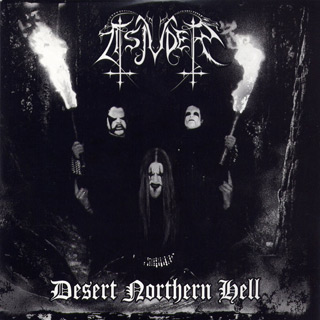

Cryptic Rock – It’s very nice. Good. Tsjuder is one of the best live bands in Black Metal, kind of like a Black Metal Motörhead. The intensity you easily conjure in the live setting, do you experience that when you record? Is the creation of your songs ever spontaneous in the studio environment, or do you and Draugluin compose in quiet solitude with a beer? Is it important to be together in the same room, and get a feeling going?
Jan Erik – It’s different. It has changed through the years. In the very beginning, it was me and Draugluin both playing guitar, and obviously, Draugluin is the guitarist, so he has always made most of the music. But we sat together, and I had a couple of riffs, he had a couple of riffs, and then it turned out to be a song. That was the way we did it, until Desert Northern Hell. Well, in between Demonic Possession (2002) and Desert Northern Hell (2004), I actually lived in Australia. I was making music there, but Draugluin was making most of the music for Desert Northern Hell. When I came back home, I arranged the last things, and I was also part of creating a few of the songs. And then, we went back to making music together again, for Legion Helvete. And on Antiliv, we did for the first time, we actually made much of the music in the rehearsal room, with the drums. We thought that worked out fine with Antiliv (2015), actually much better than expected. So we tried to do that for what turned out to be Helvegr, but that didn’t work at all. It was just hitting the wall, every rehearsal. So on Helvegr, long story short, we parted ways with Anti-Christian. And during the process, Draugluin was frustrated about everything. So he was like, “Fuck this, I’m just making music myself.”
And I was kind of in between, I was making music as well, but Draugluin put together the songs. So it was a different process on Helvegr. But I think we agree that the best is when we sit together and make music together. So that’s the plan for the next album.
Cryptic Rock – I would imagine having a smaller amount of people in the band, really, just the two of you doing the creating, does that make it easier to accomplish the goals of Tsjuder? Also, what can you tell us about the search for a permanent drummer, if there is one?
Jan Erik – Well, first of all, yes, I guess it’s easier to be two persons in the band. That said, we have friends who have always been around the band, which, we’ll let them tell us their opinion, and then we’ll decide if we’ll listen to them or not. But yeah, I guess it’s four or five guys who’ve actually either played in Tsjuder, or been close to the band for a long, long time. So we will let them have their say, as well. Regarding the drummer, recording the album with Jon Rice, it was a breeze. Everything turned out great. And yeah, it was just too easy. So the live situation has been Jon when we played in Atlanta, and we did a Latin America tour back in November of 2023. So John played that. The rest of the gigs, we’ve used Eivin Brye. He’s the drummer from, well, he plays in Mortem, and Svart Lotus, and he lives quite close to me, so it’s convenient for me and him to rehearse together. But as of today, there’s no permanent drummer. We’ve used Eivin and Jon, and we’ve also been in dialogue with a guy from Spain, but we don’t want to make any kind of decisions yet. As long as this works out, and Jon is happy, and Eivin Brye is happy with the situation, we will not rush anything.
Cryptic Rock – If the strength of Helvegr is anything to go by, it appears these have been the correct lineup decisions. Regarding the lyrics on the new album, the song Gamle-Erik, Old Erik, is that supposed to be a reference to you?
Jan Erik – Well, yeah, yeah. Of course, since my name is Erik, it’s been a thing forever. I think it’s been a thing where everyone is called Erik in Norway. But yeah, I do relate. Yeah. But the song is about the Devil.
Cryptic Rock – Fitting. How do you determine if a song is going to be sung in English or Norwegian? Because it’s a pretty cool possibility for anyone to be able to make art in two different languages. Is there any strategy when it comes to this?
Jan Erik – Not really. The thing is that the lyrics are very different when writing in Norwegian, obviously, since that’s our main language, and it’s often easier to express ourselves. That said, I don’t think it’s that hard to write English lyrics either, but there are two things. I think the expression of the lyrics will be different, but maybe the most important is that the vocals change. So, Norwegian lyrics are often easier to write, they can be a bit harder when you do the vocals, a little bit more grim. I think that’s why we’ll still use Norwegian and English. It gives some variety.
Cryptic Rock – Grimness is achieved with ease in the music of Tsjuder. Who would you say are your top influences from the world of bass guitar players?
Jan Erik – Well, first of all, the reason I picked up bass was because I lost when tossing a coin. So when I was in children’s school, primary school, it was me and Diabolus Mort, who also played in Tsjuder. So we were quite determined, from a young age, that we would start a metal band. And I remember, to this day, we were in his room, and we tossed the coin, “Whoever gets heads, play guitar.” And yeah, so I lost, so I got the bass. So that’s the story about why I’m playing the bass. Second, I don’t see myself as a musician at all. I play out of inspiration and atmosphere, and the feeling. I’ve never been interested in musical theory, or anything. I just want to play on something, to create an atmosphere and feeling. But of course, bassists, it’s Cliff Burton, I would say. Lemmy is quite okay, as well.
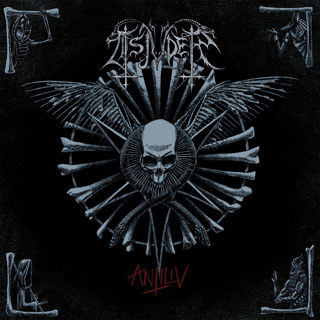
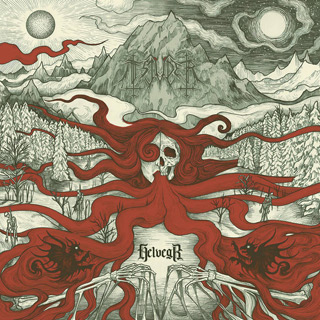
Cryptic Rock – Two monumental figures for sure. Many fans will complain about some of the bands that we grew up loving, whether it’s Black Metal, or traditional Metal, and the things we loved about them, many of these bands slowly moved away from, for various reasons. Tsjuder is especially commendable, because to this day you write the parts that people get the most excited about. And I guess it goes back to having no compromise, and no compositional departures. This material, for example in a song like “Prestehammeren,” with a clear thrash-influenced breakdown, goes down so well live. You referenced earlier playing in Latin America. How did the new material go over down there? Did the audiences go fucking nuts?
Jan Erik – Yeah, we played that in Latin America, and a few shows before that. It really works live. It’s a really good live song. And the other audience in Latin America is, well, it’s Latin America. Do I need to say more?
CrypticRock – Nope.
Jan Erik – They go crazy. I think for us, both me and Draugluin, we grew up with the old Brazilian Death Metal, like Sebludo, Sarcófago, Vulcano, all those bands. For us, I think it’s special, and we are honored to be able to go to Latin America, and play there. So, it’s a two-way street.


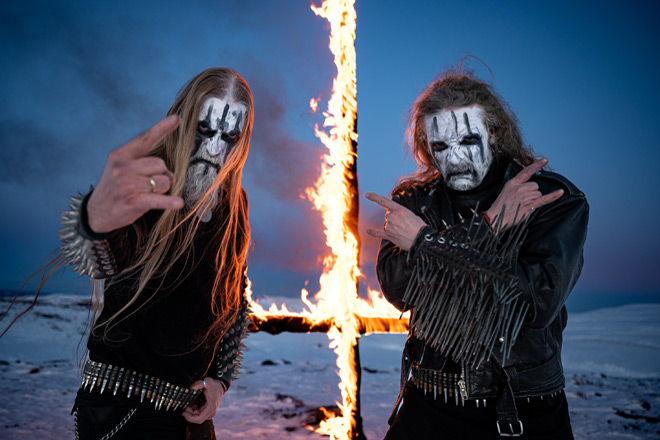
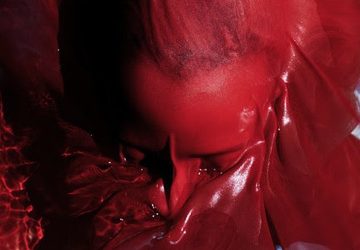



No comment